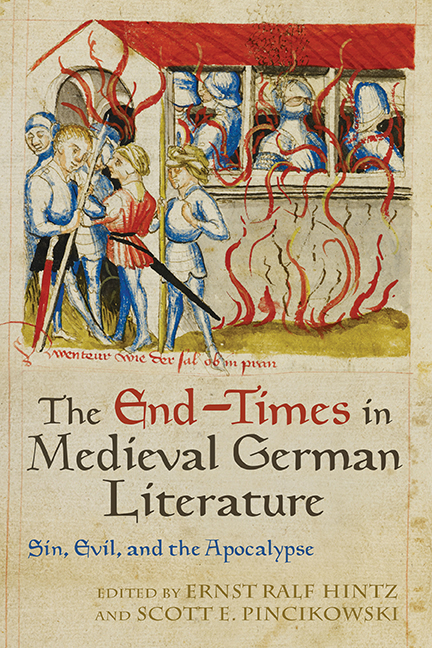Book contents
- Frontmatter
- Dedication
- Contents
- Acknowledgments
- Introduction
- 1 Thiu wirsa giburd: Cain’s Legacy, Original Sin, and the End of the World in the Old Saxon Genesis
- 2 The Heliand Revisited: Spiritual Transgendering and the Defiance of Evil
- 3 The Beginning of the End: Binary Dynamics and Initiative in Hartmann von Aue’s Gregorius
- 4 Poetic Reflections in Medieval German Literature on Tragic Conflicts, Massive Death, and Armageddon
- 5 Beyond Good and Evil: Apocalyptic Vision without Judgment in the Nibelungenlied. An Essay
- 6 End-Times in the Hall: The Modern Reception of the Apocalyptic Ending of the Nibelungenlied
- 7 Past Present, Future Present? Visualizing Arthurian Romance and the Beholder’s Share in a World That Refuses to End
- 8 Ich diene und wirbe / biz ich gar verdirbe: Lovesickness, Apocalypse, and the End-Times in Mauritius von Craûn and Das Nibelungenlied
- 9 The Slippery Concept of Evil in Hartmann von Aue’s Erec and Iwein
- 10 Wigamur’s Lessons on the Complexity of Evil
- 11 The Miracles of the Antichrist
- 12 Monsters and Monstrosities in the Pamphlet Wars of the Reformation
- Notes on the Contributors
- Index
8 - Ich diene und wirbe / biz ich gar verdirbe: Lovesickness, Apocalypse, and the End-Times in Mauritius von Craûn and Das Nibelungenlied
Published online by Cambridge University Press: 21 March 2020
- Frontmatter
- Dedication
- Contents
- Acknowledgments
- Introduction
- 1 Thiu wirsa giburd: Cain’s Legacy, Original Sin, and the End of the World in the Old Saxon Genesis
- 2 The Heliand Revisited: Spiritual Transgendering and the Defiance of Evil
- 3 The Beginning of the End: Binary Dynamics and Initiative in Hartmann von Aue’s Gregorius
- 4 Poetic Reflections in Medieval German Literature on Tragic Conflicts, Massive Death, and Armageddon
- 5 Beyond Good and Evil: Apocalyptic Vision without Judgment in the Nibelungenlied. An Essay
- 6 End-Times in the Hall: The Modern Reception of the Apocalyptic Ending of the Nibelungenlied
- 7 Past Present, Future Present? Visualizing Arthurian Romance and the Beholder’s Share in a World That Refuses to End
- 8 Ich diene und wirbe / biz ich gar verdirbe: Lovesickness, Apocalypse, and the End-Times in Mauritius von Craûn and Das Nibelungenlied
- 9 The Slippery Concept of Evil in Hartmann von Aue’s Erec and Iwein
- 10 Wigamur’s Lessons on the Complexity of Evil
- 11 The Miracles of the Antichrist
- 12 Monsters and Monstrosities in the Pamphlet Wars of the Reformation
- Notes on the Contributors
- Index
Summary
A LOS ANGELES TIMES CARTOON from February 5, 2016, depicts Ted Cruz, contestant for the US Republican presidential nomination in the 2016 campaign, with a jack-in-the-box full of puppets proclaiming “Obama is the Antichrist,” “Hellfire for Homos,” and “Oprah is Satan's Harlot.” The picture illustrates an article with the headline announcing, “Ted Cruz Embraces Apocalyptic Preachers and Anti-Gay Militants.” One infers the outcry issuing from conservative sectors: “Men are marrying men! Miley Cyrus kisses her same-sex partner in public! Transgender bathrooms! The world is clearly coming to an end!” One aspect of the current rhetoric of end-times connects the demise of the world with reconfigured gendered relations breaking with the heterosexual familial model that has dominated Western institutional discourse in recent centuries.
The current era is not the first to witness a fascination with references to the end-times, as well as tensions stemming from discourses that call into question normatively constructed gender roles. The twelfth and thirteenth centuries, for example, experienced a period of renegotiating gendered relationships and notions of masculinity in certain sectors among the Western European nobility, as scholars have noted in recent decades. James Schultz identifies an anxiety relating to the love service relationship as characteristic of many medieval German secular literary texts of the thirteenth century in response to constraints on masculine behavior imposed by models of courtly love and courtliness. These systems, Schultz suggests, challenged conceptions of masculinity that were based predominantly on fighting and the domination of women, along with extramarital access to them (173–79). The subservience of a man to a woman theorized in love service also contradicts, of course, one influential Christian view of the ideal relationship between the sexes, with woman subordinated to man as head of household, as well as the gendered models of power expressed in much medieval medical and legal discourse.
Schultz analyzes evidence of constraint and masculine anxiety in Wolfram von Eschenbach's Parzival and Willehalm, Hartmann von Aue's Iwein and Erec, and the Nibelungenlied, among other late twelfth and thirteenth-century texts composed in medieval German. Other recent studies consider literary evidence of an anxiety or tension regarding alternative manifestations of masculine gender, which do not conform to a dominant (or hegemonic, often violent) masculinity
- Type
- Chapter
- Information
- The End-Times in Medieval German LiteratureSin, Evil, and the Apocalypse, pp. 168 - 189Publisher: Boydell & BrewerPrint publication year: 2019



